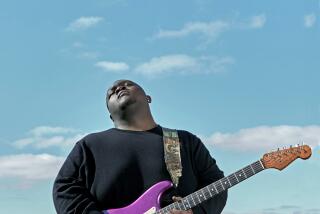Albert King; Influential Blues Guitarist
- Share via
Albert King, the larger-than-life, free-swinging blues guitarist whose languishing career soared after such rock greats as Eric Clapton acknowledged his influence on their music, has died.
The 6-foot, 4-inch, 250-pound performer was 69 and died Monday after a heart attack in Memphis, Tenn. His last performance was at the Rhythm Cafe in Santa Ana on Dec. 13.
His repertoire of songs based on Mississippi Delta blues, coupled with his raucous, infectious renditions of them, had drawn fans as early as the 1950s. But interest in him faded until some popular rock musicians recently singled him out for attention.
The Indianola, Miss., native made his first recordings in the early 1950s--”Bad Luck Blues” and “Be on Your Merry Way.” During the 1960s, he hit the blues charts with songs such as “Laundromat Blues” and “Don’t Throw Your Love on Me So Strong.”
Clapton copied King’s guitar solo from “Personal Manager” note for note in the song “Strange Brew” on his group Cream’s “Disraeli Gears” album. Guitarist Stevie Ray Vaughan’s music also paid homage to King.
“Every time you hear a rock ‘n’ roll guitar player, he’s playing Albert King licks,” said Wayne Jackson, a member of the Memphis Horns, a band King had performed with.
King played his guitar left-handed but did not restring the instrument from the right-hand configuration. Part of his distinctive sound came because he pulled on the strings while other players pushed.
He taught himself that odd style as a child hanging around clubs in Forest City, Ark., near Memphis, where his mother had settled the family. He was in his teens when he bought a guitar from a boyhood friend for $1.25 and spent months teaching himself to play.
At the end of the 1940s he was doing construction work in Little Rock, Ark., during the day and fronting his band at night. His group, the In the Groove Band, developed a following, but it was not until he moved to Gary, Ind., and met some officials at Parrot records that his recording career got under way.
He made a recording of “Lonesome in the Night” that brought him to the attention of Muddy Waters and other bluesmen.
That single was followed by “Baby You Don’t Have to Go” for Vee Jay Records and “Shake a Tail Feather.”
As young guitarists popularized the blues in the 1960s, King began to get more lucrative bookings and his career flourished. His 1968 album “Live Wire--Blues Power” was recorded at Fillmore West in San Francisco, a major venue of the time.
In a review of his last public appearance, Times writer Bill Kohlhaase said King’s “ability to tell a story with his guitar remains fully intact. His solos were packed with runs of clipped, crystalline notes. . . . He punished his strings with strongly bent tones and sizzling slides” while “his voice retains much of the strong, woody quality that distinguished his sound during his heyday . . . in the ‘60s.”
At the time of his death, King was planning a European tour next year with fellow bluesmen B.B. King and Bobby (Blue) Bland.
“He was one of a kind,” Bland told the Associated Press. “There was never any type of jealousy when we three worked together on a package. One just pushed the others.”
More to Read
The biggest entertainment stories
Get our big stories about Hollywood, film, television, music, arts, culture and more right in your inbox as soon as they publish.
You may occasionally receive promotional content from the Los Angeles Times.










